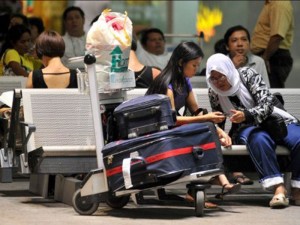
HOPEFULLY MORE TOURISTS Passengers wait for their Philippine Airlines (PAL) flight at the Ninoy Aquino International Airport (NAIA) in this photo taken in July last year. The Management Association of the Philippines proposes the establishment of a privately run tourism promotion board, which will hopefully increase tourist arrivals. AFP
The Management Association of the Philippines is urging the government to allow the private sector to spearhead tourism promotion in the country to enable the Philippines to get a bigger chunk of tourist arrivals from all over the world.
In a statement issued Monday, the business group suggested the establishment of a privately run Tourism Promotion Board.
“To fulfill the promise of tourism—a 12-percent total contribution to the [gross domestic product] and a total of 5.6 million jobs generated by 2020—there must be a keener appreciation of the needs and wants of our identified tourism markets, from which will emanate a concrete, targeted, cohesive and innovative marketing strategy,” the group said.
Such a strategy could only be formulated with the cooperation of all relevant sectors. The Department of Tourism should not take on this task single-handedly.
MAP said that while the Philippines had so much going for it—beautiful beaches, diverse marine life, mostly young and educated population, English-speaking citizens, good food and state-of-the-art medical facilities—the country was among the laggards in the region in terms of tourism.
Citing data from a recent report by the United Nations World Tourism Organization, the group noted that the Philippines managed to attract only 3.5 million tourists last year, behind Vietnam’s 5 million, Indonesia’s 7 million, Singapore’s 9.1 million, Thailand’s 15.8 million, Hong Kong’s 20.1 million and Malaysia’s 24.5 million.
In terms of tourism receipts in the region, the country generated only $2.7 million last year, a huge difference from top tourism money-makers Hong Kong with $22.9 million, Thailand with $19.7 million, and Malaysia with $17.8 million.
MAP urged the government to take advantage of the Tourism Congress, a private-sector consultative body that would develop, implement and coordinate tourism policies. The Tourism Congress was created under RA 9593, or the Tourism Act of 2009.